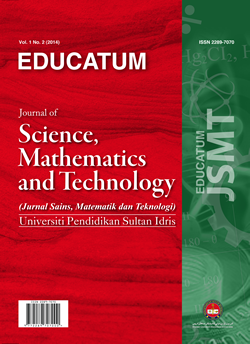Cell-Wolf game: A teaching tool for understanding Meiosis in form four Biology
DOI:
https://doi.org/10.37134/ejsmt.vol10.2.4.2023Keywords:
Cell-Wolf Game, Meiosis, Game-Based Learning, Teaching toolAbstract
The complexity of meiosis, combined with a lack of knowledge about chromosomes and misconceptions, contributes to students' difficulty understanding this process. Therefore, this study aimed to develop a Cell-Wolf Game as a teaching tool for form four biology students learning about meiosis and to assess its usability based on teacher trainees' perceptions. This study uses a developmental research design by employing ADDIE model as the instructional design model. Two instruments were used in this study: expert validation form and the usability perception of the questionnaire. Two biology lecturers have been appointed to assess the validity of teaching aid material content and questionnaires. A total of 103 trainee teachers from the Bachelors of Education (Biology) programme were selected as respondents for the field study. The study showed the content validity index for both the teaching aid material, and the questionnaire is 1.0, meanwhile, the reliability index for questionnaire was 0.76. The study showed that the trainee teacher's perception of the teaching aid material’s design, teaching aid material’s content, and the usability of the teaching aids is 3.76 (SD = 0.33), 3.68 (SD = 0.42) and 3.64 (SD = 0.47), respectively. In conclusion, the Cell-Wolf Game was successfully developed and validated in this study. Furthermore, trainee teachers' perceptions of the game have a high mean value, indicating that it is appropriate to be implemented as a teaching aid during teaching and learning sessions to create a fun learning environment, thereby strengthening students' understanding.
Downloads
References
Kementerian Pendidikan Malaysia. (2018). Pelan Pembangunan Pendidikan Malaysia 2013-2025 (Laporan Tahunan 2018) (Malaysia, Kementerian Pendidikan). Putrajaya, Kuala Lumpur: Kementerian Pendidikan Malaysia.
Mohd Shapri, N. I. & Che Ahmad, C. N. (2020). The Validation of Gamification Based Module (Bio-GamyX) for Teaching and Learning Biology. International Journal of Education, Psychology and Counseling, 5(35), 21-30. doi:10.35631/ijepc.535003 .
Wahid, R. (2020). Keberkesanan Pembelajaran Berasaskan Permainan dalam Kalangan Pelajar Institusi Pengajian Tinggi. Journal of Education and Social Sciences, 16(1), 9-13.
Tangkui, R. B., & Keong, T. C. (2020). Kesan Pembelajaran Berasaskan Permainan Digital Minecraft Terhadap Pencapaian Murid Tahun Lima dalam Pecahan. Malaysian Journal of Social Sciences and Humanities (MJSSH), 5(9), 98-113. doi:10.47405/mjssh.v5i9.476
Wan Mohamed Salleh, W. N., Che Ahmad, C. N. & Setyaningsih, E. (2021). Difficult Topics in Biology From the View Point of Students and Teachers Based on KBSM Implementation. EDUCATUM JSMT, 8(1), 49-56. doi:https://doi.org/10.37134/ejsmt.vol8.1.6.2021.
Murtonen, M., Nokkala, C., & Södervik, I. (2020). Challenges in Understanding Meiosis: Fostering Metaconceptual Awareness among University Biology Students. Journal of Biological Education, 54(1), 3-16.
Yakob, N., Kaliun, K., Ahmad, A. M., Rashid, R. A. A., & Abdullah, A. (2020). The Effect of Coupled Inquiry-5E in Enhancing the Understanding of Meiosis Concept. International Journal of Evaluation and Research in Education, 9(1), 129-137.
Anastasiadis, T., Lampropoulos, G., & Siakas, K. (2018). Digital Game-Based Learning and Serious Games in Education. International Journal of Advances in Scientific Research and Engineering, 4(12), 139-144.
Plass, J. L., Homer, B. D., Mayer, R. E., & Kinzer, C. K. (2020). Theoretical Foundations of Game-Based and Playful Learning. in J. L. Plass, R. E. Mayer, & B. D. Homer (Eds.), Handbook of Game-Based Learning (pp. 3–24). The MIT Press.
Davis, A. L. (2017). Using Instructional Design Principles to Develop Effective Information Literacy Instruction: The ADDIE Model. College & Research Libraries News, 74(4), 205–207.
Krejcie, R. V. & Morgan, D. W. (1970). Determining Sample Size for Research Activities. Educational and Psychological Measurement, 30(3), 607-610.
Rahim, N. & Lee, T. T. (2021). Pembangunan Modul E-pembelajaran Asid Bes (e-PAB) Menggunakan Google Classroom. Journal of Science and Mathematics Letters, 6(1), 1-10. doi:https://doi.org/10.37134/jsml.vol9.1.1.2021.
Sidek M.N. & Jamaludin, A. (2005). Pembinaan Modul: Bagaimana Membina Modul Latihan dan Modul Akademik. Serdang: Penerbit Universiti Putra Malaysia.
Ahmed, I., & Ishtiaq, S. (2021). Reliability and Validity: Importance in Medical Research. Methods, 12, 13.
Huck, S. W. (2014). Reading Statistics and Research. Harlow, United Kingdom: Pearson.
Khalid, F. & Rosly, R. (2017). Gamifikasi: Konsep dan Implikasi dalam Pendidikan. Pembelajaran Abad ke-21: Trend Integrasi Teknologi, 144-154.
Mahat, H., Arshad, S., Salleh, Y., Aiyub, K., Hashim, M. & Nayan, N. (2020). Penggunaan dan Penerimaan Bahan Bantu Mengajar Multimedia Terhadap Keberkesanan Pembelajaran Geografi. GEOGRAFIA Onlineᵀᴹ Malaysian Journal of Society and Space, 16(3), 219-234.
Dean, T., Lee-Post, A., & Hapke, H. (2017). Universal Design for Learning in Teaching Large Lecture Classes. Journal of Marketing Education, 39(1), 5-16.
Abdullah, M. F. N. L., & Wei, L. T. (2017). Kesahan dan kebolehpercayaan instrumen penilaian kendiri pembelajaran geometri tingkatan satu. Malaysian Journal of Learning and Instruction, 14(1), 211-265.
Hasanah, N. (2020). Pelatihan Penggunaan Aplikasi Microsoft Power Point Sebagai Media Pembelajaran Pada Guru SD Negeri 050763 Gebang. Jurnal Pengabdian Kepada Masyarakat, 1(2), 34-41.
Baker, J. P., Goodboy, A. K., Bowman, N. D., & Wright, A. A. (2018). Does teaching with PowerPoint Increase Students' Learning? A Meta-Analysis. Computers & Education, 126, 376-387.
Guat, T. M. (2010). Pandangan Guru Pelatih Terhadap Buku Teks Bahasa Melayu Kurikulum Bersepadu Sekolah Rendah. Jurnal Penyelidikan IPG KBL, 9, 1-13.
Xiao, M., Tian, Z., & Xu, W. (2023). Impact of Teacher-Student Interaction on Students’ Classroom Well-Being Under Online Education Environment. Education and Information Technologies, 1-23.
Sun, H. L., Sun, T., Sha, F. Y., Gu, X. Y., Hou, X. R., Zhu, F. Y., & Fang, P. T. (2022). The influence of teacher–student interaction on the effects of online learning: Based on a serial mediating model. Frontiers in Psychology, 13, 779217.
Downloads
Published
Issue
Section
License
Copyright (c) 2023 Syazwan Saidin, Anis Aisyah Abdul Halim

This work is licensed under a Creative Commons Attribution-NonCommercial-ShareAlike 4.0 International License.





